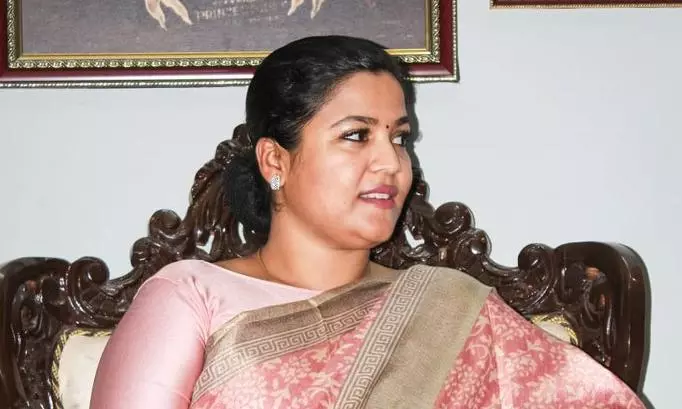
TN: BJP's Ranjana Natchiyaar joins Vijay’s party in protest over 'Hindi imposition'
Natchiyaar slammed BJP’s three-language policy and hailed Vijay as 'the next MGR' and Tamil Nadu’s biggest hope

In a significant move, actor-turned-politician Ranjana Natchiyaar resigned from the Bharatiya Janata Party (BJP) and switched camps to join Vijay's Tamilaga Vettri Kazhagam (TVK).
Her departure from the BJP, a party she was associated with for eight years, stems from her dissatisfaction with its policies, particularly the Centre's alleged efforts to impose Hindi in the state.
Concerns over three-language policy
Natchiyaar announced her resignation on Tuesday (February 25), expressing concerns over the BJP's promotion of a three-language policy. She believed this policy undermines Tamil Nadu's linguistic heritage and disregards the state's unique cultural identity.
In her resignation letter, she wrote, "As a Tamil woman, I cannot accept the imposition of the three-language policy, growing hostility towards Dravidians, and neglect of Tamil Nadu's needs and aspirations."
Also Read: 'Hindi imposition' row: Vijay compares BJP-DMK feud over NEP with ‘fight among KG kids’
The following day, Natchiyaar officially joined TVK during the party's anniversary celebration at a private resort near Chennai. At the event, she praised Vijay, the party's founder, referring to him as "the next MGR".
The late MG Ramachandran, the actor turned populist politician was the former chief minister of Tamil Nadu.
Natchiyaar pointed out that Vijay's blend of nationalism and Dravidian policies resonated deeply with her.
Claiming that TVK is the ideal platform for her politically, she said, "Vijay is the biggest hope for Tamil Nadu." Her move to TVK is being seen as a fallout of the BJP's push for the three-language formula, which has been criticised by the ruling Dravida Munnetra Kazhagam (DMK) as 'Hindi imposition'.
Also Read: KIIT student suicide: Student raised complaints twice, PoSH panel was not in loop
The controversy surrounding the three-language policy has a long history in Tamil Nadu. The state has consistently opposed the imposition of Hindi, viewing it as a threat to its linguistic and cultural identity. The DMK and All India Anna Dravida Munnetra Kazhagam (AIADMK), traditionally fierce rivals, have joined together to slam the BJP's efforts to implement the National Education Policy (NEP).
This policy mandates the teaching of a third language in schools, which often means Hindi.
In her resignation letter, Natchiyaar expressed concerns about the practicality of this policy. She wrote, "Not all children are linguists... and children need not be forced to learn another language. There is no dire need." Her sentiments echo the broader apprehension in Tamil Nadu regarding the NEP's language provisions.
Also Read: Activists blacken Hindi in TN railway station signboard amid language row
TVK's view
At the TVK anniversary event, Vijay also addressed the contentious education policy. He dismissed the ongoing language dispute between Tamil Nadu and the Centre as a "fight between KG students," suggesting that the issue is being blown out of proportion.
However, he also protested against the three-language policy underlined in NEP (under which learning Hindi is compulsory) saying it was against the spirit of cooperative federalism and the two-language policy implemented by the state government.
Ongoing feud
The language debate has escalated tensions between Tamil Nadu's state government and the central authorities.
Chief Minister MK Stalin accused Union education minister Dharmendra Pradhan of "blackmail" after the latter suggested that Rs 2,400 crore in central funds would be withheld if the state did not fully implement the NEP. In response, Stalin and his deputy, Udhayanidhi Stalin, have denounced the policy and warned the BJP-led central government that Tamil Nadu is prepared for another 'language war'.
Also Read: Will not implement NEP even if Rs 10,000 crore offered to TN: CM Stalin
‘False narrative’
Stalin even penned a letter to Prime Minister Narendra Modi, stressing on the state's opposition to the policy. In a subsequent interview, minister Pradhan accused the DMK of creating a "false narrative," claiming that Tamil Nadu had initially agreed to the policy before reversing its stance for political reasons.
Ripple effect
The pushback against 'Hindi imposition' in Tamil Nadu has also influenced neighbouring states. In Telangana, the state government has made learning Telugu mandatory in all schools across all boards, including those under the central CBSE.
This move reflects a broader regional resistance to policies perceived as favouring Hindi over local languages.
Also Read: Tamilians have died for their language, so don't play with it: Kamal Haasan
Growing discontent
Natchiyaar's move from the BJP to TVK shows the growing discontent in Tamil Nadu over the BJP-led Centre's language policies.
Her decision pinpoints the importance regional identity and the preservation of linguistic heritage play in the state's political landscape. As debates over language and cultural autonomy continue, Tamil Nadu's political dynamics are poised for further evolution.

